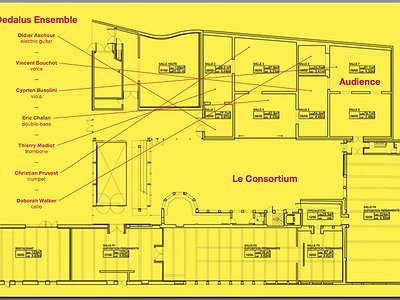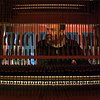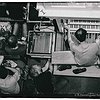Part 3
Music-sharing sites and -blogs as well as a flood of releases in general are presenting both listeners and artists with challenging questions. What's your view on the value of music today? In what way does the abundance of music change our perception of it?
I am not connected to any value that would be given to rareness. Abundance of musics, musicians, and exchanges doesn't bother me at all.
What were some of the most important creative challenges when starting out as a composer and how have they changed over time?
I wanted and still want a composition to be a problem for the instrumentalists to which the interpretation is one of the possible answers. That means that I don't try at all to write the music that I can play when I improvise, and even less I try to ask someone else to play the music I play : I ask instrumentalists to take on some tasks that I probably wouldn't be able to achieve properly. Being an interpreter is a full time job.
The problem I just talked about can be an ergonomic problem ("my harp as a filter" or "dyslexic harp deciphered in the dark"), technical ("a signature of the room"), etc. They are inspiring and implicate the form, in the same way that space and disposition also are.
I also try to write music that is not totally coming from the way it's written.
Tell us about your studio/work space, please. What were criteria when setting it up and how does this environment influence the creative process? How important, relatively speaking, are factors like mood, ergonomics, haptics and technology for you?
My studio is most of the time (more and more ...) in a mess that probably no one on earth could stand (sorry) ! And to be honest, I don't really want others to come in ... a little bit like a fucked up burrow in which I can take refuge ... something like a secret place also, where possible secret actions are taking place. Also ... I can work anywhere ...
Could you take me through the process of composing on the basis of one of your pieces that's particularly dear to you, please? What do you start with when working on a new piece, for example, how do you form your creative decisions and how do you refine them?
I send you the presentation of a text I wrote with eric la casa about the process of composing. It's about a composition and an installation we did in Melbourne : "Reflected Waves". I think we answer as precisely as possible your question in it. It's edited here and here.
In 2005, Jean-Luc Guionnet and Eric La Casa were invited by the Festival Liquid Architecture to lead a topographical and sound research on Melbourne, Australia. The artists sound mapped the city's four cardinal points as well as the Central Business District to work with the landscape's reflected waves. The result was shown at West Space Gallery in the form of an audiovisual installation. This edition offers a complete description of the process as well as an analysis of the recordings and mixing protocols.
I can now give the example of "Hearsay Distances", just released on Potlatch :
I decided
1 - to compose for an open orchestra (any instruments, any size).
2 - with no director
3 - a real site specific form ... (architecture specific ?) with 2 key-sounds :
- standing waves (site specific frequencies)
- duration of the reverberation
Then I built kind of a point of view or an auditive perspective on the architecture by setting, casting or distributing the orchestra in a building that has to include several spaces / rooms. The audience is in the room or the space number 1 with one of the musicians. Then the whole orchestra is one by one (or two by two, etc.) in the other spaces numbered after the distance to room 1. Then the rooms and the musicians are odd or even. Then the distance is influencing the dynamics, etc. The whole composition is deduced little by little from the first spatial setup.
What, if anything, do you personally draw from the cosmos of electronic music and digital production tools that is inspiring for your daily practise? In how far do you see the potential for a mutual creative pollination between the two?
Since the beginning of my artistic and musical adventure I never had to oppose the new technologies against the old ones. And I like to remind to myself of the sentence that Xenakis liked to say about technology : "I see it as a tool to amplify archaism in music". I agree, and I also think that new technology doesn't have the musicians that it deserves : When new technologies are used to redo old musical forms merely a little bit differently, they are very very boring and not interesting at all. Machines shouldn't be the slaves of our conservative thoughts but partners in crime ! We have to play with them to arrive at something good.
Time is a variable only seldomly discussed within the context of contemporary composition. Can you tell me a bit about your perspective on time in relation to a composition and what role it plays in your work?
I have always tried to avoid timers ... And that decision informs the music. The way musicians hear or don't hear each other, the way an information disseminates into the whole orchestra without any outside reference like a director, a count or a clock, the way a sound can masks another one, the way a mistake in time has to be somehow included in the whole system and finally the way it's not a mistake any more, etc. Like it could be said in a improvisation context but as far as possible from it as long as the situation, the relations, the laws, the rules, the constraints and the conditions ... ecosystems are concerned.
Do you have a musical vision that you haven't been able to realise for technical or financial reasons – or an idea of what music itself could be beyond its current form?
Yes and no again ... I always try to incorporate the economical and technical conditions as life incoporates those of the natural environment. Of course, to compose for a symphonic orchestra with choir, organ and electronic big band plus spatial diffusion could be exiting ... but I can't help considering this idea as stupid if it becomes a goal of itself ... and it often does : the kind of feedback I try to avoid! There is other feedback that I prefer a lot.
Then I'd like to have more time to work on the propositions, and more money ... That's the main problem : time is getting short (because I am getting old ? or, being connected 24/24, is it really going faster and faster ?).
Let's have strategies to fuck up the runaway, and get the time back.







